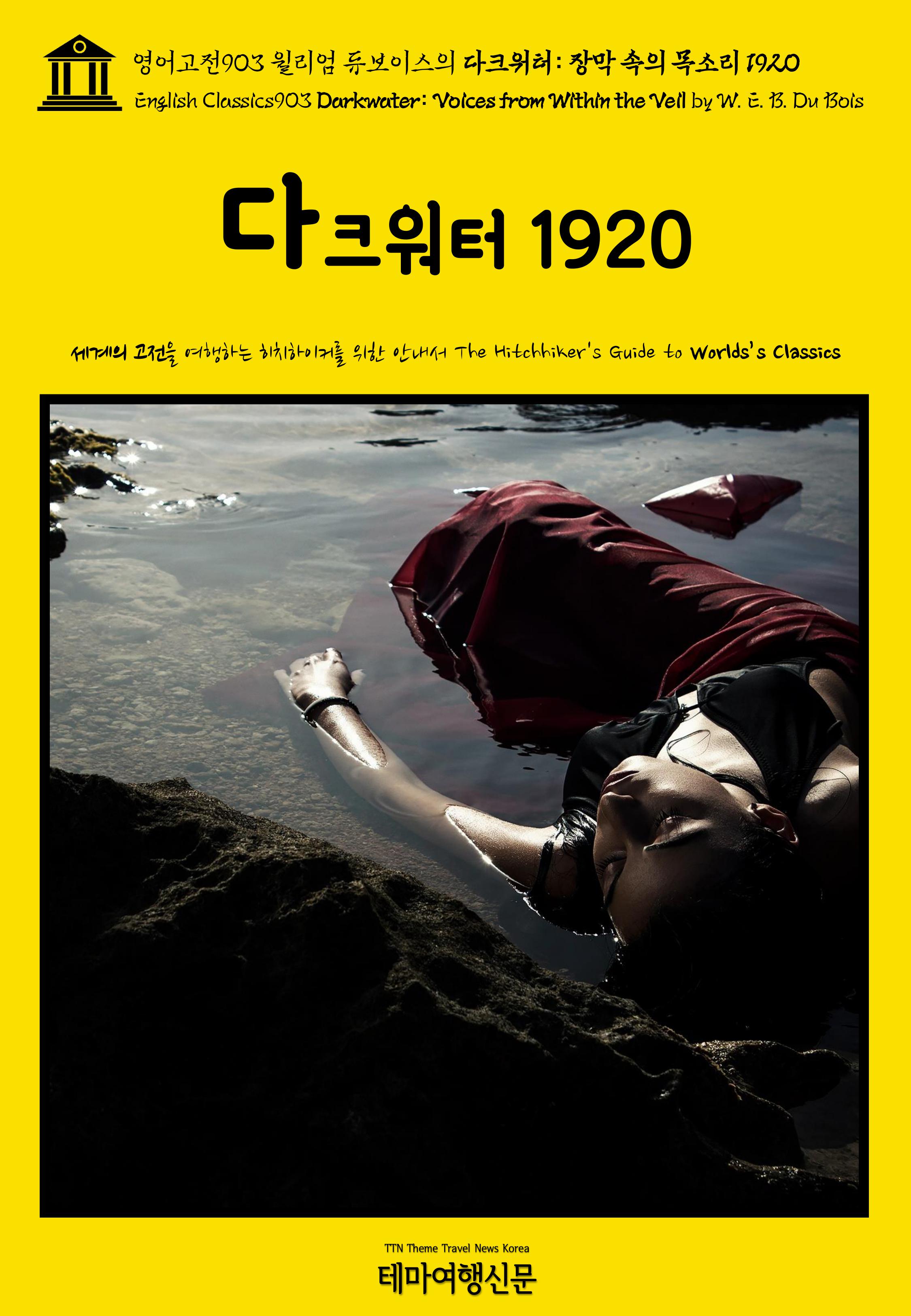▶ 다크워터: 장막 속의 목소리(Darkwater: Voices from Within the Veil by W. E. B. Du Bois)(1920)는 윌리엄 듀보이스(W. E. B. Du Bois)(1868~1963)가 사회학자이자 노예제 해방론자, 교수로 왕성하게 활동하며 50세의 나이에 발표한 자전적 작품으로 자전적인 이야기를 비롯한 에세이, 시, 영성(spirituals) 등이 복합적으로 포함되어 있습니다. 작가가 아틀란틱(The Atlantic), 인디펜던트(The Independent), 크라이시스(The Crisis), 인종발전 저널(Journal of Race Development) 등 다양한 매체에 발표한 내용을 다수 포함하고 있으며, 포스트스크립트(Postscript)에서 이에 대한 감사를 표시하였습니다. 제1장 세월의 그림자(The Shadow Of Year)부터 제10장 혜성(The Comet)까지 총 10개의 장으로 구성되어 있으며, 각각의 장마다 기독교 사상에 기반을 둔 기도문이나 짤막한 단편이 첨부되어 있습니다. 특히 서두에 위치한 크레도(Credo)는 작품과 별개로 당대의 흑인 기독교 신자들에게 널리 애독되었습니다. 테마여행신문 TTN Korea 영어고전(English Classics)과 함께 어제도, 오늘도, 내일도 멋진 문학여행을! B
▶ Credo. I believe in God, who made of one blood all nations that on earth do dwell. I believe that all men, black and brown and white, are brothers, varying through time and opportunity, in form and gift and feature, but differing in no essential particular, and alike in soul and the possibility of infinite development./Especially do I believe in the Negro Race: in the beauty of its genius, the sweetness of its soul, and its strength in that meekness which shall yet inherit this turbulent earth./I believe in Pride of race and lineage and self: in pride of self so deep as to scorn injustice to other selves; in pride of lineage so great as to despise no man's father; in pride of race so chivalrous as neither to offer bastardy to the weak nor beg wedlock of the strong, knowing that men may be brothers in Christ, even though they be not brothers-in-law.
▷ 신조(Credo). 나는 땅에 사는 모든 민족을 한 혈통으로 만드신 하나님을 믿습니다. 나는 모든 인간이 형제이며, 시간과 기회에 따라, 형태와 은사, 특징이 다르지만 본질적인 특징이 다르며 영혼과 무한한 발전 가능성이 비슷하다고 믿습니다./특히 나는 흑인 인종을 믿습니다. 그 천재성의 아름다움, 영혼의 달콤함, 그리고 이 격동의 땅을 아직 상속받을 온유함의 힘을 믿습니다./나는 인종과 혈통과 자아의 자부심을 믿습니다. 다른 사람에 대한 불의를 경멸할 만큼 깊이; 어떤 사람의 아버지도 경멸하지 않을 만큼 위대한 혈통에 대한 자부심으로; 인종을 자랑하여 기사도를 행하여 약한 자에게 남의 자식을 주며 강한 자의 혼인을 구하지 아니함은 사람이 동포는 아니어도 그리스도 안에서 형제가 될 줄 앎이라.
▶ I. THE SHADOW OF YEARS. Last year I looked death in the face and found its lineaments not unkind. But it was not my time. Yet in nature some time soon and in the fullness of days I shall die, quietly, I trust, with my face turned South and eastward; and, dreaming or dreamless, I shall, I am sure, enjoy death as I have enjoyed life.
▷ 제1장. 세월의 그림자. 작년에 나는 죽음의 얼굴을 보았고 그 혈통이 불친절하지 않다는 것을 발견했습니다. 하지만 내 때가 아니었습니다. 그러나 자연 속에서 머지않은 장래에 나는 조용히 죽을 것이며, 나는 내 얼굴을 남쪽과 동쪽으로 돌린 채 죽을 것이라고 믿습니다. 그리고 꿈을 꾸든 꿈이 없든, 나는 인생을 즐겼던 것처럼 죽음을 즐길 것이라고 확신합니다.
▶ III. THE HANDS OF ETHIOPIA. Always Africa is giving us something new or some metempsychosis of a world-old thing. On its black bosom arose one of the earliest, if not the earliest, of self-protecting civilizations, which grew so mightily that it still furnishes superlatives to thinking and speaking men. Out of its darker and more remote forest fastnesses came, if we may credit many recent scientists, the first welding of iron, and we know that agriculture and trade flourished there when Europe was a wilderness.
▷ 제3장. 에티오피아의 손. 항상 아프리카는 우리에게 새로운 것을 주고 있습니다. 그 검은 가슴에는 가장 초기는 아니더라도 가장 초기의 자기 보호 문명 중 하나가 생겨났으며, 이 문명은 매우 강력하게 성장하여 여전히 생각하고 말하는 사람들에게 최상급을 제공합니다. 더 어둡고 외딴 숲에서 견고함이 생겨났고, 우리가 최근의 많은 과학자들을 인정할 수 있다면, 최초의 철 용접이며, 우리는 유럽이 황무지였을 때 그곳에서 농업과 무역이 번성했다는 것을 알고 있습니다.
▶ IV. OF WORK AND WEALTH. I taught history and economics and something called "sociology" at Atlanta University, where, as our Mr. Webster used to say, we professors occupied settees and not mere chairs. I was fortunate with this teaching in having vivid in the minds of my pupils a concrete social problem of which we all were parts and which we desperately desired to solve. There was little danger, then, of my teaching or of their thinking becoming purely theoretical.
▷ 제4장. 업과 부에 대하여. 저는 애틀랜타 대학교에서 역사와 경제학, 그리고 "사회학"이라는 것을 가르쳤습니다. 웹스터 씨가 말했듯이 우리 교수들은 단순한 의자가 아닌 긴 의자를 사용했습니다. 나는 이 가르침을 통해 우리 모두가 한 부분이고 우리가 간절히 해결하고자 하는 구체적인 사회 문제를 학생들의 마음에 생생하게 기억할 수 있어서 운이 좋았습니다. 그러므로 나의 가르침이나 그들의 생각이 순전히 이론적인 것이 될 위험은 거의 없었습니다.
▶ VII. THE DAMNATION OF WOMEN. I remember four women of my boyhood: my mother, cousin Inez, Emma, and Ide Fuller. They represented the problem of the widow, the wife, the maiden, and the outcast. They were, in color, brown and light-brown, yellow with brown freckles, and white. They existed not for themselves, but for men; they were named after the men to whom they were related and not after the fashion of their own souls.
▷ 제7장. 여성의 저주. 나는 내 소년 시절의 네 명의 여성을 기억합니다. 어머니, 사촌 이네즈, 엠마, 이데 풀러입니다. 그들은 과부, 아내, 처녀, 추방자의 문제를 나타냈습니다. 그들은 색깔이 갈색과 옅은 갈색, 갈색 주근깨가 있는 노란색, 흰색이었습니다. 그들은 자신을 위해 존재한 것이 아니라 인간을 위해 존재했습니다. 그들은 그들 자신의 영혼의 양식이 아니라 그들이 관련된 사람들의 이름을 따서 명명되었습니다.






